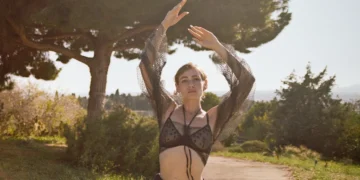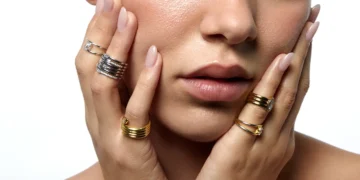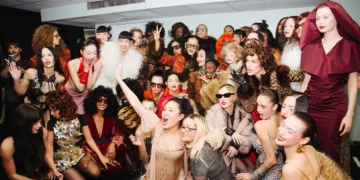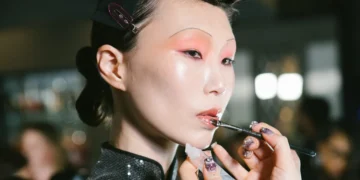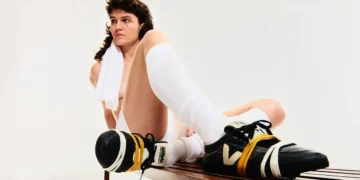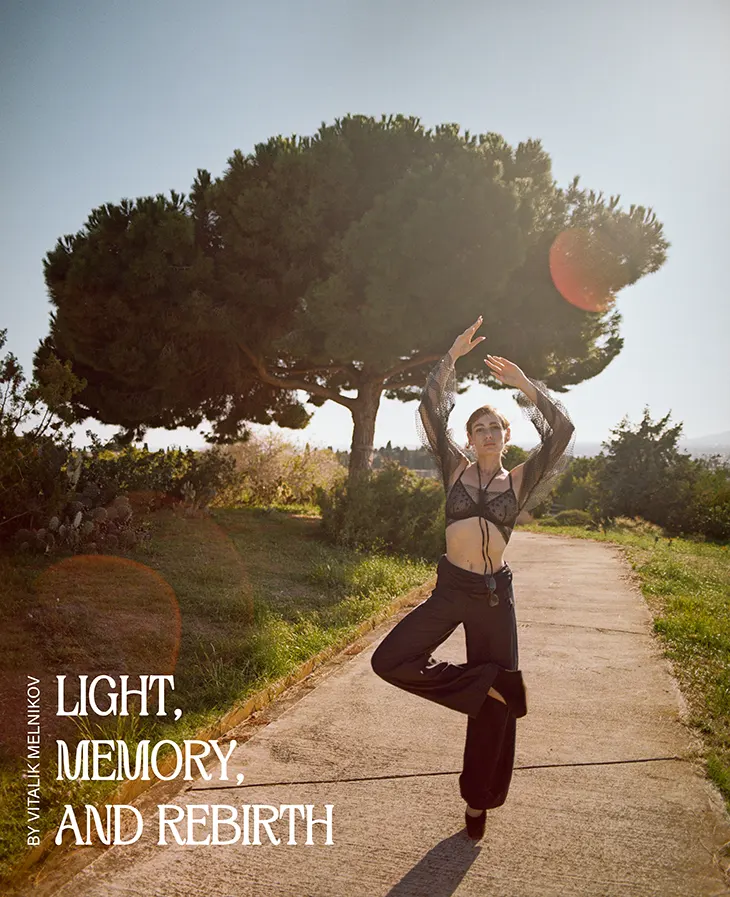
Kristina Luna has always existed somewhere between sound and feeling. The Ukrainian singer, model, and former photographer built her name on music that feels both celestial and intimate, dream pop threaded with quiet intensity. Since her 2016 debut, she has become a defining figure of Eastern Europe’s avant-pop movement, crafting records that move like memories: shimmering, vulnerable, and deeply human. Her voice drifts between languages and moods, translating emotion into rhythm, melancholy into light.
MUSIC
In this interview, editor Katarina Doric meets Luna in her new chapter, one shaped by motherhood, emigration to Spain, and a renewed sense of purpose. Their conversation moves between poetry and confession, touching on healing, silence, and freedom. Luna describes art as the way she continues to exist, across distance, memory, and time.
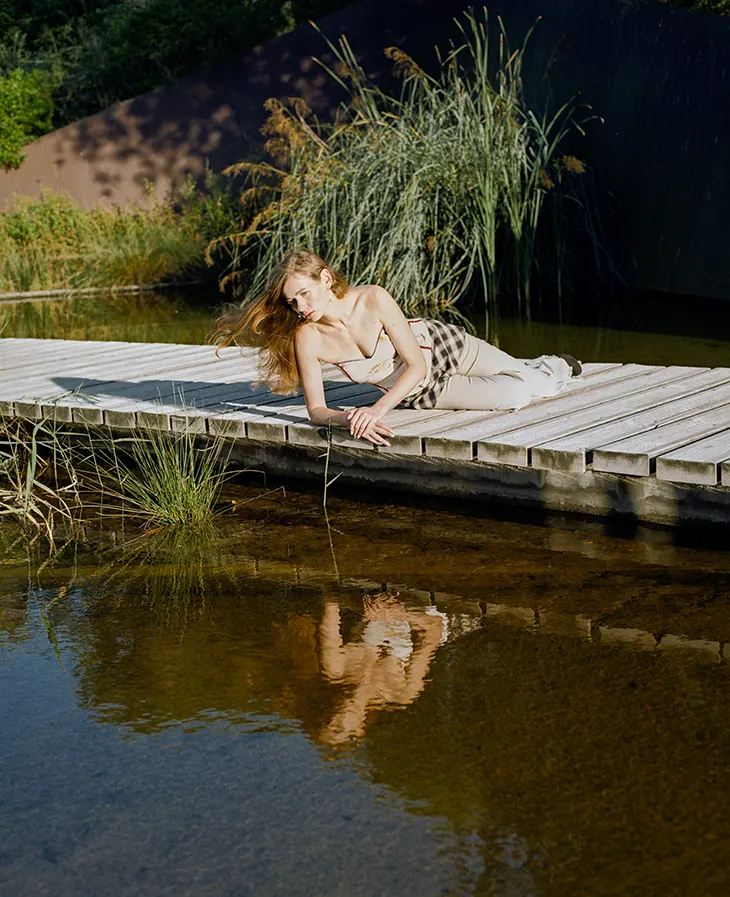
You’ve often been described as a dream pop icon, yet your work carries a rawness that cuts through the haze. How do you balance softness with power in your music? – My music has always been a reflection of my inner landscape, every record is like a diary of a different version of me. Writing and composing have always been something spiritual, almost ritualistic. I create when I need to heal without even realizing it, or when there’s something within me that words alone can’t carry. I’m not sure balance is the right word, it’s more like a dance between opposites. Softness and strength, light and darkness, they’re always in conversation. I don’t try to separate them.
The melodies and lyrics usually come from a very emotional, intuitive space, that’s my chaos. The production, on the other hand, is shaped by my husband, Sasha. He brings structure, precision, and a kind of grounded masculinity into the sound. Together we form a sort of yin and yang: emotion and logic, air and earth. Maybe that’s why people feel both fragility and power in my songs, because that’s what I’m made of. Both.
My music has always been a reflection of my inner landscape, every record is like a diary of a different version of me.
Performing live can turn private emotions into shared experiences. Has being on stage changed how you relate to your own music? – Since my first album, I’ve been touring. The love from the audience for particular songs has only deepened my own connection to them. It’s a strange and beautiful feedback loop: their emotions give new colors to mine. But the magic of live shows is that songs never stay the same. Some pieces that feel quiet in the studio suddenly explode on stage, they gain velocity, shape, and new states of being. Every performance feels like solving a puzzle of sound, emotion, and energy.
“Luna’s Live” has become its own ritual, a kind of post-shared therapy. There’s a moment when the energy settles, and I feel ease within myself, mirrored by the same ease in the crowd. The audience becomes close, almost sacred. That’s the special level I always try to reach.
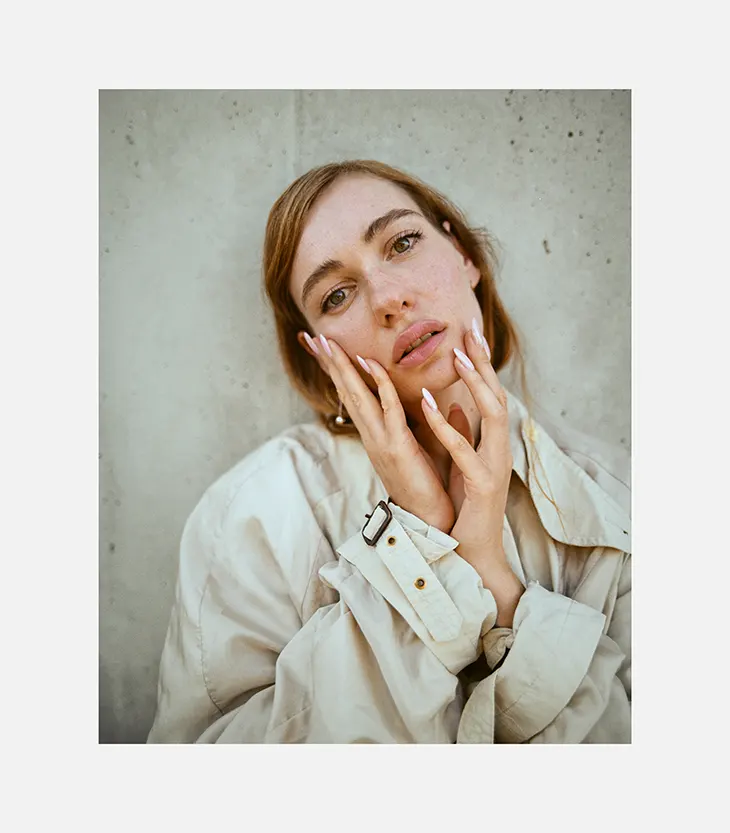
Your lyrics often touch on desire, solitude, and transcendence. Do you write from memory, imagination, or instinct? – Inspiration is never one thing for me, it’s a constant creation and search, twenty-four seven. Sometimes it comes from dreams, sometimes from real life, or from people I cross paths with, their feelings, their actions. Those become fragments of light that my imagination refracts into color.
Art, for me, is both security and surrender. Writing is the way I give form to what I can’t explain, to make sense of chaos, to give it a place in “Luna’s world.” So yes, all of the above. Memory, imagination, instinct, they coexist and melt into one another. That’s where the songs are born.
Writing is the way I give form to what I can’t explain, to make sense of chaos, to give it a place in “Luna’s world.”
You’ve said meditation and silence are part of your daily rhythm. What does silence mean to someone who builds entire worlds out of sound? -Meditation and silence are the base, like the ground you need before you build a mood. To really hear something, you have to be silent first. There’s no melody without the pause between notes. I think we live in a time of digital overexposure, so much information going out, almost none coming in. Silence becomes a form of protection, a reset. For me, it’s where I return to equilibrium, before the next wave of creation starts.
It’s not about emptiness, though. Silence isn’t nothing, it’s the space where everything begins to take shape.
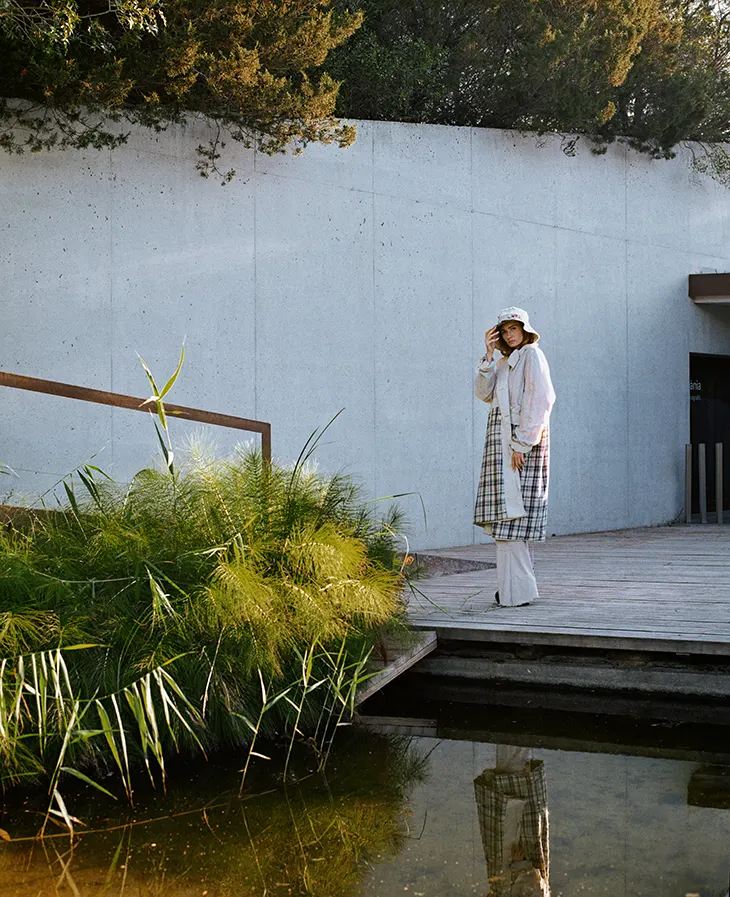
What’s on your playlist right now? Any unexpected songs or artists you’re obsessed with? – Always Cocteau Twins, the parents of shoegaze. Their sound is like velvet static, it feels timeless, ethereal, and still somehow painfully human. They remind me that emotion doesn’t always need translation, it can live inside pure texture.
Ethel Cain. There’s something magnetic about her, this mix of vulnerability and brutality. Her music reminds me that beauty lives in the raw, unfiltered parts of being human, it’s what I’m drawn to, both as a listener and as a creator.
Lately, I’ve also been obsessed with white noise and binaural Hz tones, they calm me down, align my thoughts, almost like an invisible tuning. The Horrors, Connan Mockasin, Nala Sinephro.
To really hear something, you have to be silent first. There’s no melody without the pause between notes.
Many artists from the post-Soviet scene built their image on irony or detachment, but yours feels vulnerable and sincere. Was that a conscious rebellion or just who you are? – I never worked from references. I’ve always just been my true self. Maybe sincerity feels rebellious today, but for me it’s simply the only way I know how to exist in art. I’m not interested in playing characters, I’d rather stay open, even if that means being fragile in front of everyone.
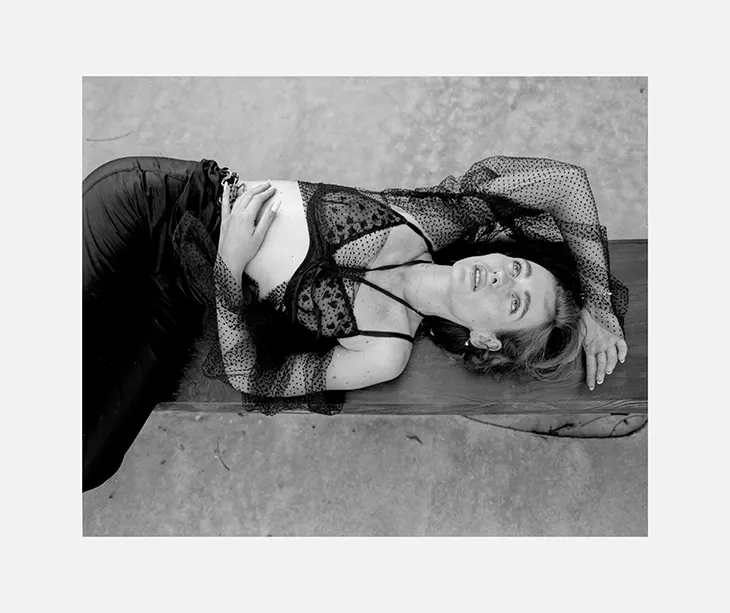
What does freedom look like to you now, as an artist, as a woman, and as someone who’s constantly reinventing herself? – Freedom, to me, is self-realization without pressure – complete autonomy. Creating without asking for permission. It’s emotion and authenticity, allowing myself to be everything: calm, chaotic, soft, wild. To exist without influence, without the need to filter who I am. No agenda. No hidden purpose. No need to be understood by everyone – just the ability to live and create from an honest place.
When people tell me to tone it down, to be more polished or “easier to read,” I stop listening. Some days I look chaotic, some days I’m serene – and both are real. I don’t want to be edited by anyone else’s gaze. On a deeper level, freedom means having no fear to start again. To rebuild, to shift, to be reborn over and over. It’s the courage to leave behind places, people, or versions of myself that no longer serve growth. I’ve done that more than once. Each time it hurts, but it also feels like breathing again.
Freedom isn’t stability, it’s movement. It’s choosing to rebuild your own world every time it starts to feel like someone else’s.
I’m not interested in playing characters, I’d rather stay open, even if that means being fragile in front of everyone.
Where do you feel most at peace with the world? – Nature resets me completely. It’s where I can finally hear my own rhythm again. Hiking for hours with no music, just the sound of my steps and the wind moving. That’s where I feel aligned, no noise, just being part of something wider. Peace, for me, isn’t silence, it’s harmony.
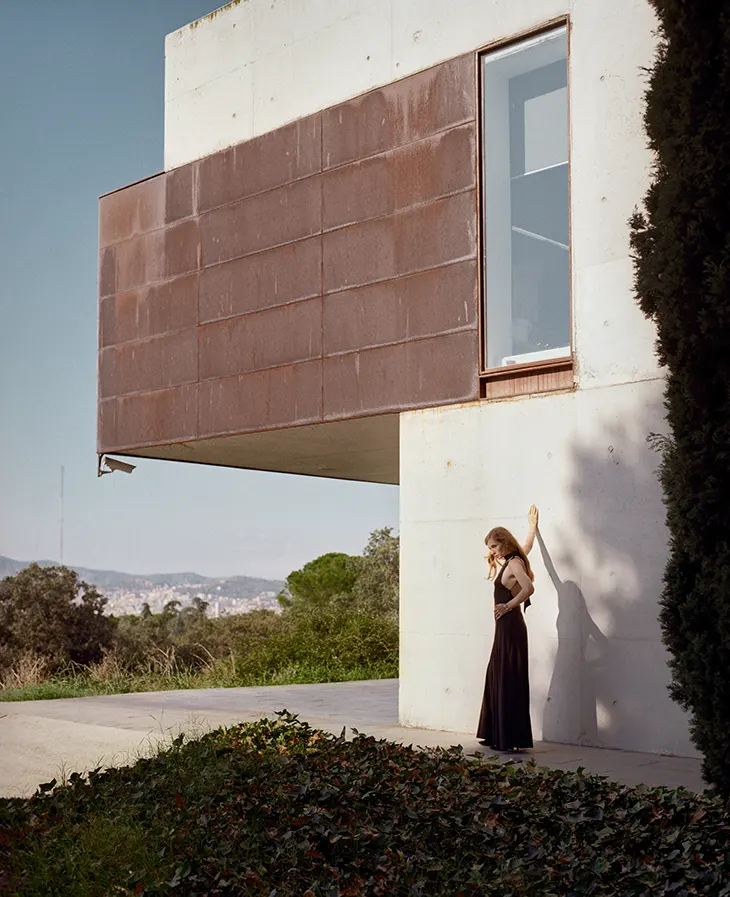
What’s the most recent movie that made you cry? – Lake Mungo. The film tells a story of a family grieving the sudden death of their daughter, who drowned in a lake. It’s about loss, about the things left unsaid, the way grief distorts time. I didn’t expect to feel so much from it. It made me cry because it doesn’t dramatize grief, it just shows how it lingers, like a shadow in everyday life. It shows how we, as humans, fill the emptiness with the echoes of what we want to believe in.
What are you reading right now, or what book do you always return to? – Lately, I’ve been especially inspired by women’s autobiographical books. When I read the thoughts of strong, complex women and recognize something of myself in them, it feels like enormous support. It allows me to step back, to see myself from the outside, and to relax.
Right now, I’m reading Julia Cameron’s Floor Sample. She’s such a fascinating author. Her philosophy reminds me that creativity is not about pushing or proving, it’s about allowing, giving space for silence, mistakes, tenderness. Reading her feels like a long, grounding conversation with someone who truly understands what it means to rebuild yourself from within.
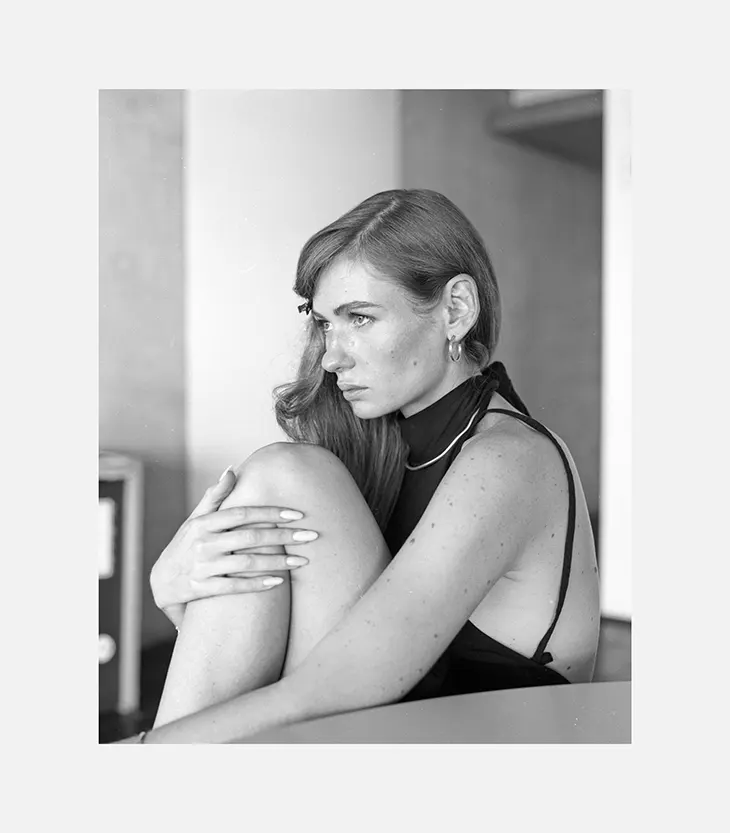
What is the last thing you took a picture of? – My younger son. I take pictures of him almost every day. It’s funny, I used to photograph moments for their aesthetics before, but now it’s more about presence, catching the way he laughs, or how sunlight hits his blonde hair for just a second. Those small, ordinary things that end up meaning everything.
Freedom isn’t stability, it’s movement. It’s choosing to rebuild your own world every time it starts to feel like someone else’s.
Do you believe in life after death, or do you think everything we are stays here in memory and energy? – The older I get, or maybe the closer I get to the idea of death, the more I find myself thinking about meeting my loved ones again. I don’t know if I believe in heaven in the traditional sense, but I do believe there’s something beyond all of this, some continuation of love that doesn’t need form or body, in memory perhaps.
I think of life after death as small, quiet traces like a song, a scent, a light flickering at the right moment, you know. I sometimes feel my relatives in that way, like they pass by for a second, in the wind or in my child’s laugh, or when something unexplainable suddenly happens out of nowhere. Maybe it’s memory, maybe it’s energy, maybe it’s just the attempt to fill in that emptiness I was talking about earlier. I don’t know.
The ancient Egyptians had this beautiful belief, that you live as long as your name is spoken. Forgetting was the real death. I feel very close to that idea. Maybe that’s what art is for me, a way to keep my name, my legacy alive. Every song, every photograph, every sound carries a small pulse of who I am, and as long as someone listens and remembers me, I shall exist.
So yes, I believe in something after this, but not as an ending. More like an expansion. Maybe heaven isn’t somewhere up there, maybe it’s right here, in the echo that cannot fade.
What’s next for you? – The past few years were absorbed by motherhood and emigration to Spain. I had to pause, first because there was no time, then because there was no strength. But usually, after such emptiness comes a wave: new knowledge, new people, new meanings. I love living by the sea, it feels more relaxing, slower paced. And I like that. Emigration was a small death for me; the old life ended, and the new one demands carefulness and tenderness.
Now I feel ready to explore myself again, a new self. The new music feels like a new breath, and it’s fascinating to watch it unfold. Everything is new: new place, new rhythm, new sound. Life here has already started echoing in my work, pouring quietly into songs that feel like light after silence.
I’m working on the new releases, on the very first English record, it is very exciting, it feels like expanding Luna’s world. No dates yet; I hope the “no deadlines” period lasts a bit longer this time. I want the release to happen when it feels ready, not when I push myself into limits.
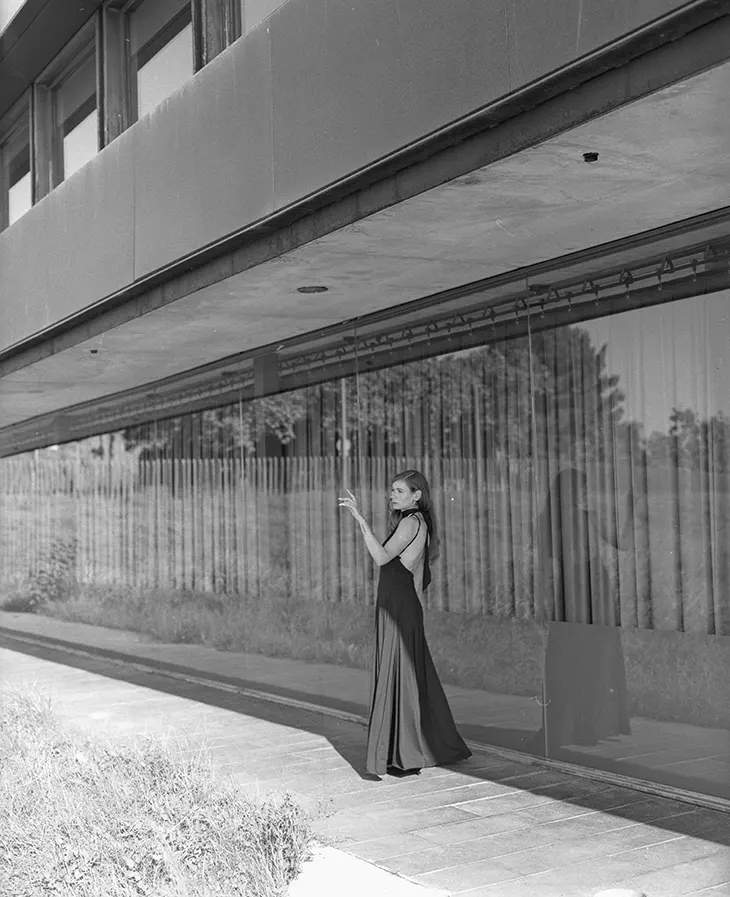
Talent: Kristina Luna
Photography: Vitalik Melnikov
Styling: Kristina Luna & Vitalik Melnikov
Retouch: Walter Olio
Special thanks to Moirai Shop
